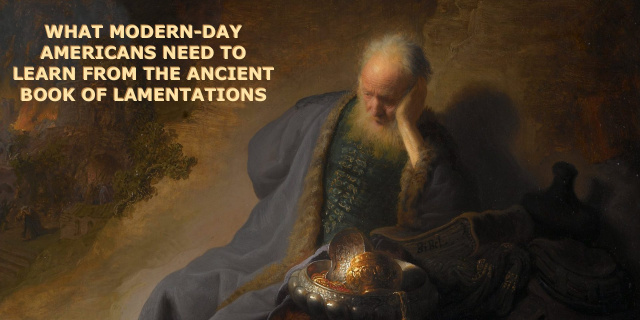 Years ago, during a Wednesday night prayer meeting, I asked everyone to name their favorite book of the Bible. I’ve never forgotten one lady’s response: “The book of Lamentations.” I’d never heard anyone prior to that evening, nor have I heard anyone since, pick Lamentations as their favorite book of the Bible. However, I’ve come to a far greater appreciation of Lamentations since then; so much so that I would no longer be so surprised to hear it cited by someone as their most cherished portion of Scripture.
Years ago, during a Wednesday night prayer meeting, I asked everyone to name their favorite book of the Bible. I’ve never forgotten one lady’s response: “The book of Lamentations.” I’d never heard anyone prior to that evening, nor have I heard anyone since, pick Lamentations as their favorite book of the Bible. However, I’ve come to a far greater appreciation of Lamentations since then; so much so that I would no longer be so surprised to hear it cited by someone as their most cherished portion of Scripture.
The book of Lamentations gets its name from the first word in the book. Although its initial Hebrew word means “lament” or “dirges,” it can be translated “how.” The book is comprised of five laments or dirges; that is, five funeral songs or poems that are sung or recited by the book’s author over the destruction of his beloved city—Jerusalem. The question on the grieving author’s mind is: “How could such a thing happen to Jerusalem, the city of God?”
The author, Jeremiah, who was known as the weeping prophet, like our Lord, who was known as a Man of sorrows, wept over the city of Jerusalem. Both predicted Jerusalem’s coming judgment and destruction to their unbelieving countrymen. Jeremiah predicted the coming destruction of Jerusalem by the King of Babylon, Nebuchadnezzar, in 586 B.C. Jesus predicted the coming destruction of Jerusalem by Titus the Roman in 70 A.D.
In addition to the above similarities between Christ and Jeremiah, which may help explain why many people in His day mistook Jesus for Jeremiah come back from the dead (Matthew 16:13-14), there is a most fascinating legend associated with Jeremiah’s authoring of Lamentations. It is believed that Jeremiah wrote Lamentations overlooking Jerusalem’s destruction from a grotto on the side of a nearby hill called Golgotha. If this is so, then the site of Jeremiah and our Lord’s greatest anguish was at the same place, where Jeremiah penned Lamentations from his grotto and where Christ died on the cross.
The question of how judgment and destruction could befall Jerusalem, a city believed to be invulnerable under the favor of God, is clearly answered on Golgotha. It happened in 586 B.C. because of Jerusalem’s unrepentant rebellion against God and again in 70 A.D. because of Jerusalem’s rejection of Christ. Here, we find the modern-day relevance of this ancient and mournful tome, as well as a harrowing omen for ourselves. Are we woefully witnessing today the judgment and destruction of America, a country that believes itself to be invulnerable under the favor of God, because of our unrepentant rebellion against God and rejection of Jesus Christ?

